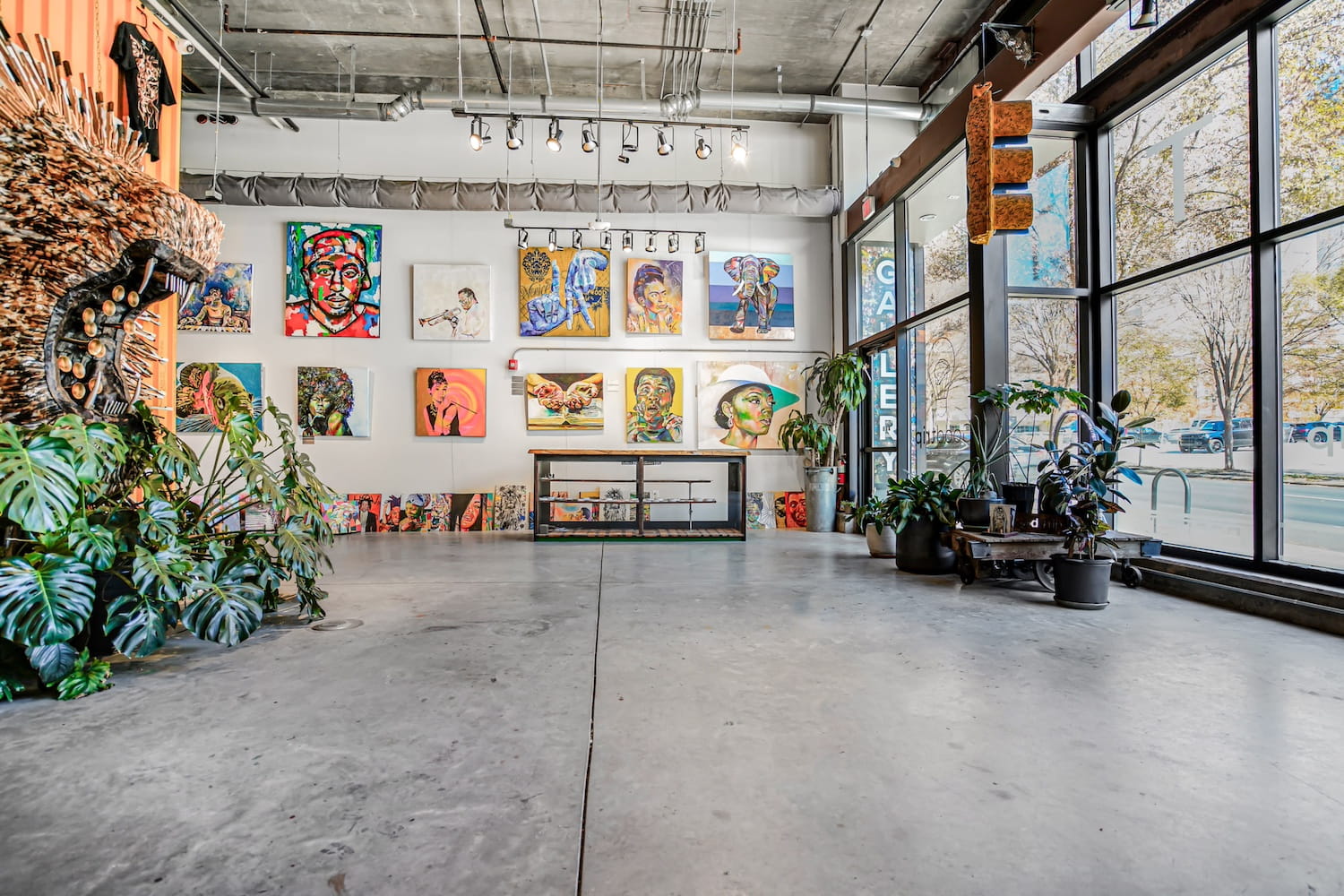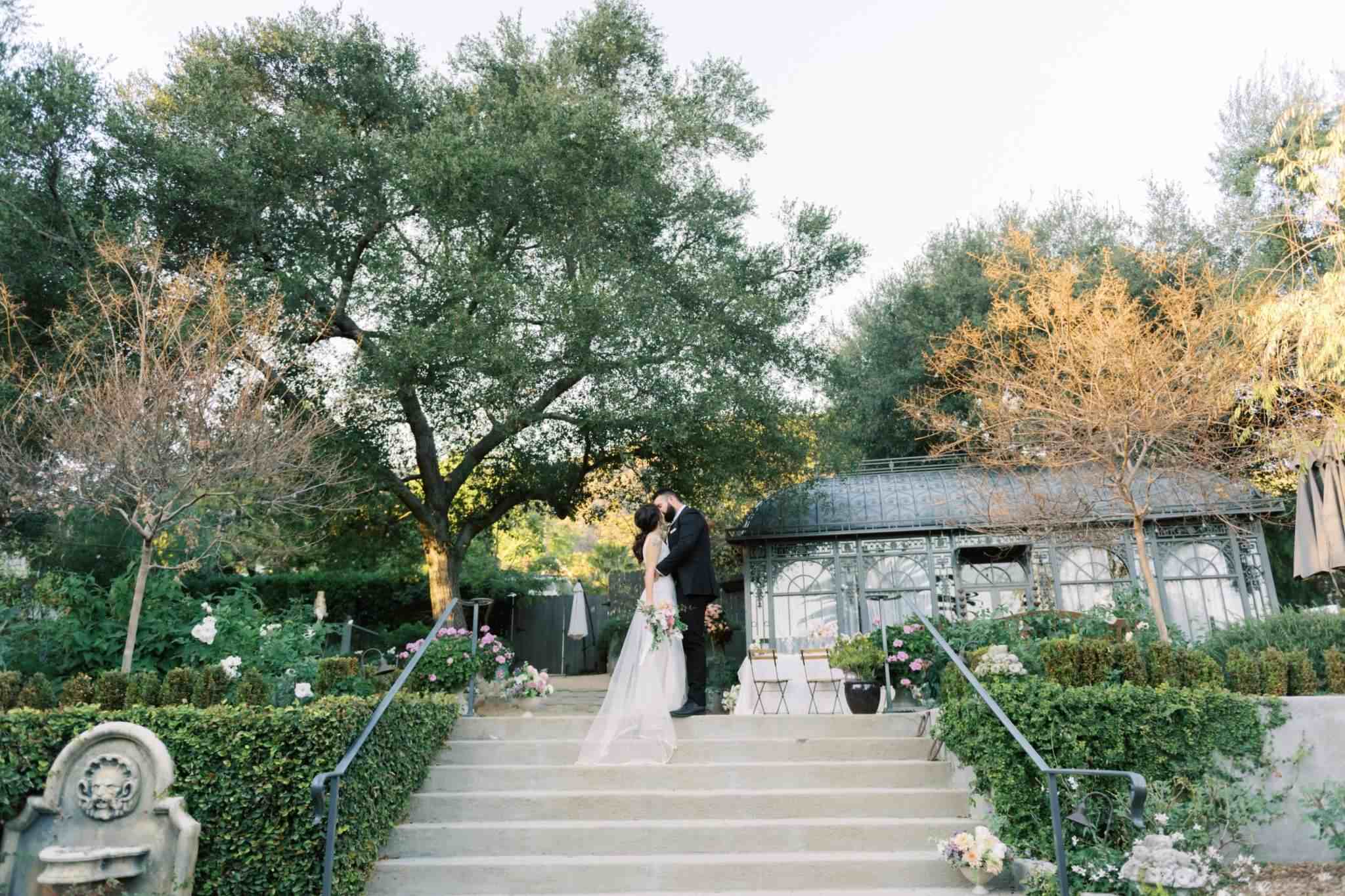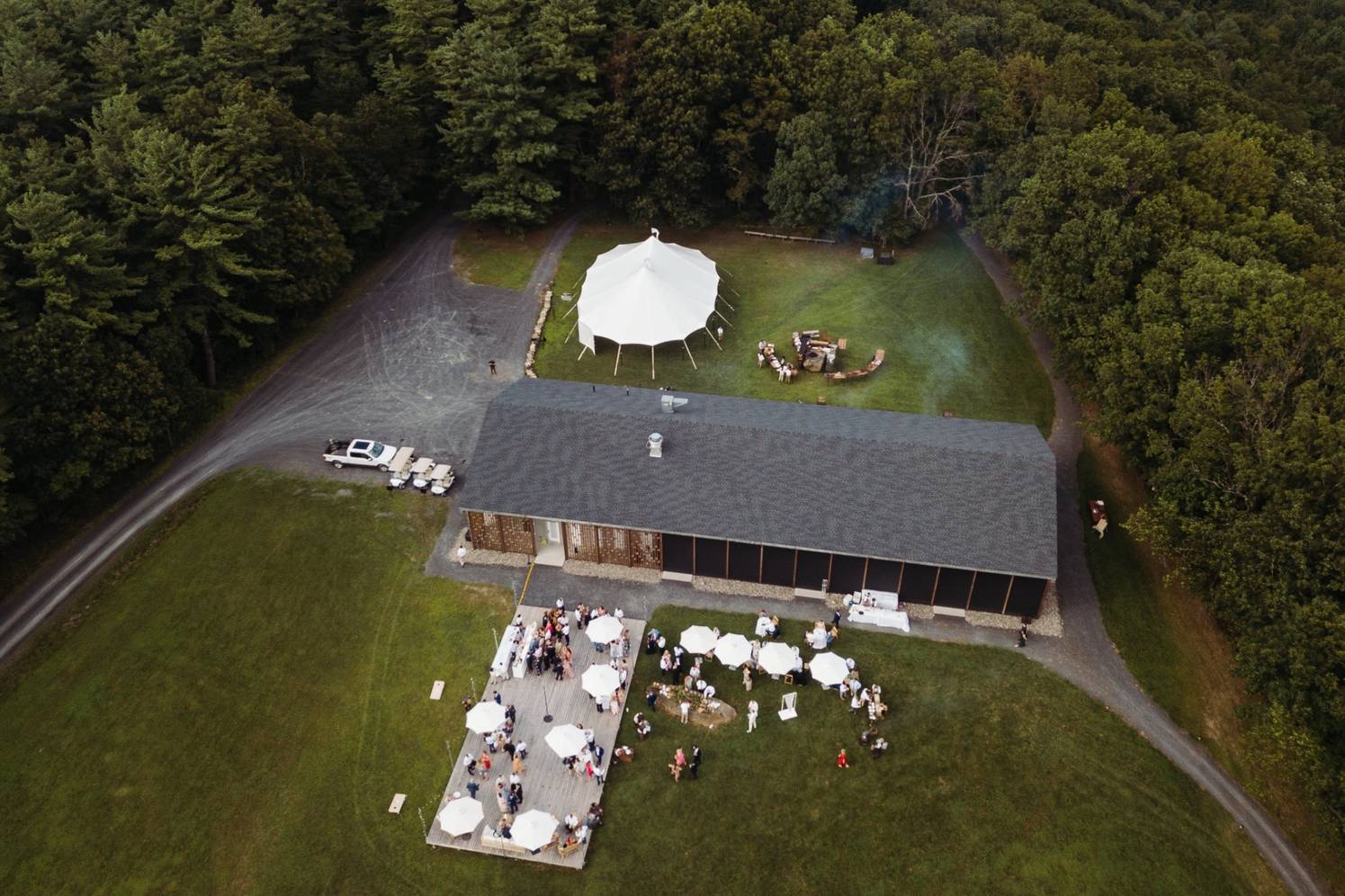How and Where to Rent an Airbnb Wedding Venue in Florida (2026)
-

Lead Editor & Publisher
- August 5, 2025
- 13 min read
- Events
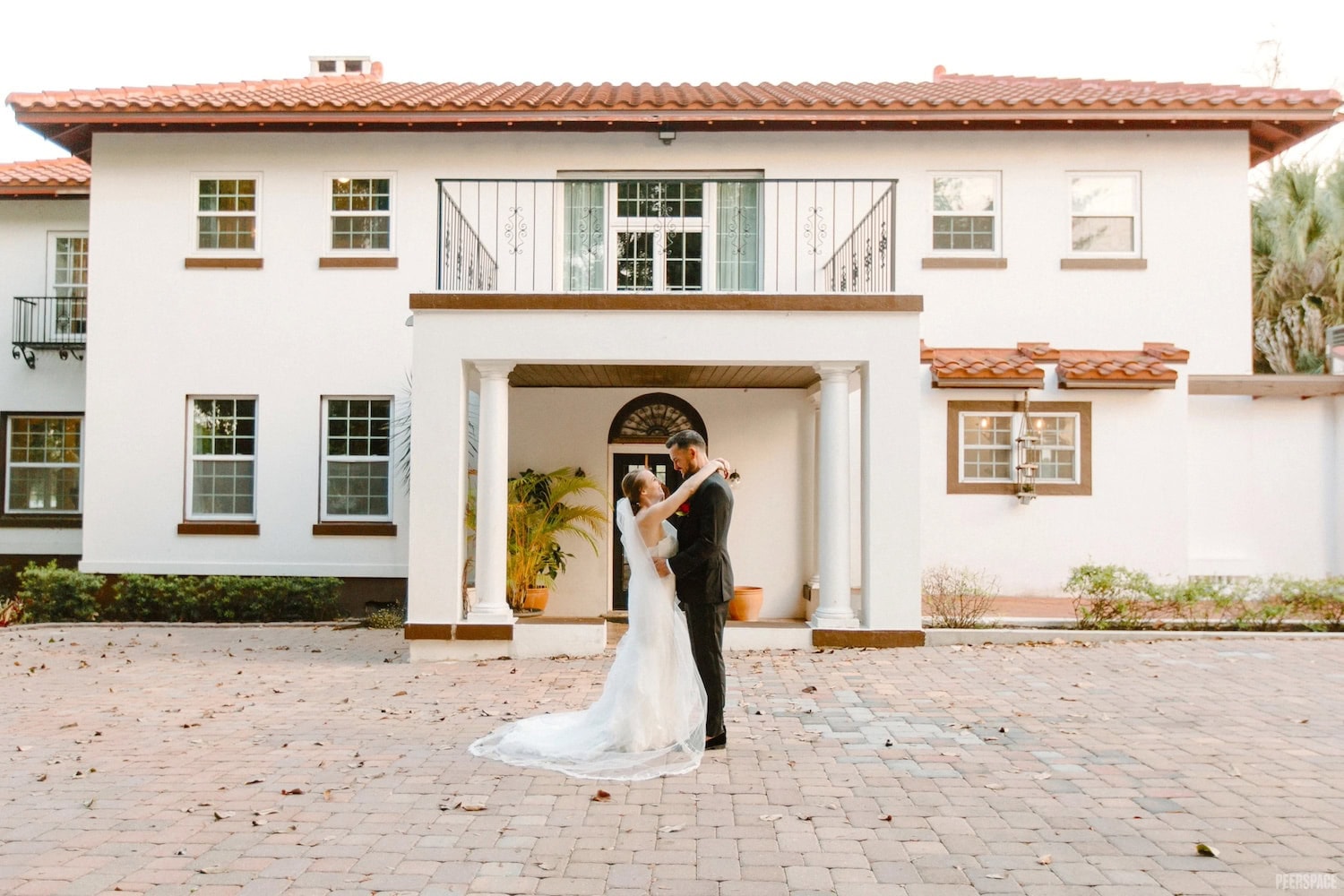
Source: Peerspace
From the sugar-sand shores of Siesta Key to the lush gardens of Winter Park, Florida sets a magical scene for tying the knot. With nearly year-round sunshine, vibrant coastal charm, and endless scenic backdrops, it’s no wonder couples from around the country flock to the Sunshine State for their big day. But be careful if you’re googling for airbnb wedding venues Florida.
Airbnb properties can look picture-perfect online, but your dream wedding might turn into a nightmare for reasons you may not anticipate. Behind the pretty photos are party bans, guest limitations, and venues not designed to accommodate real events. The logistics of transforming a vacation rental into a full-scale wedding venue can be costly, even downright impossible.
Here’s the good news: there’s a better way to find your perfect Florida wedding venue and create an unforgettable experience. This guide will walk you through how to plan a wedding in Florida, including how to find your ideal venue and prep it for your big day, laws you need to know about, how to budget wisely, and how to curate a guest experience that wows. We’ve got everything covered to help you plan your dream wedding. Let’s dive in.
Table of contents
- The challenges with Airbnb
- Why Peerspace is a better choice
- What not to do when planning a Florida wedding
- Matching wedding vibes with a venue
- How to prep your venue
- Thoughtful touches for guests
- Florida wedding laws
- Average venue costs in Florida
Real challenges with Airbnb for Florida wedding rentals
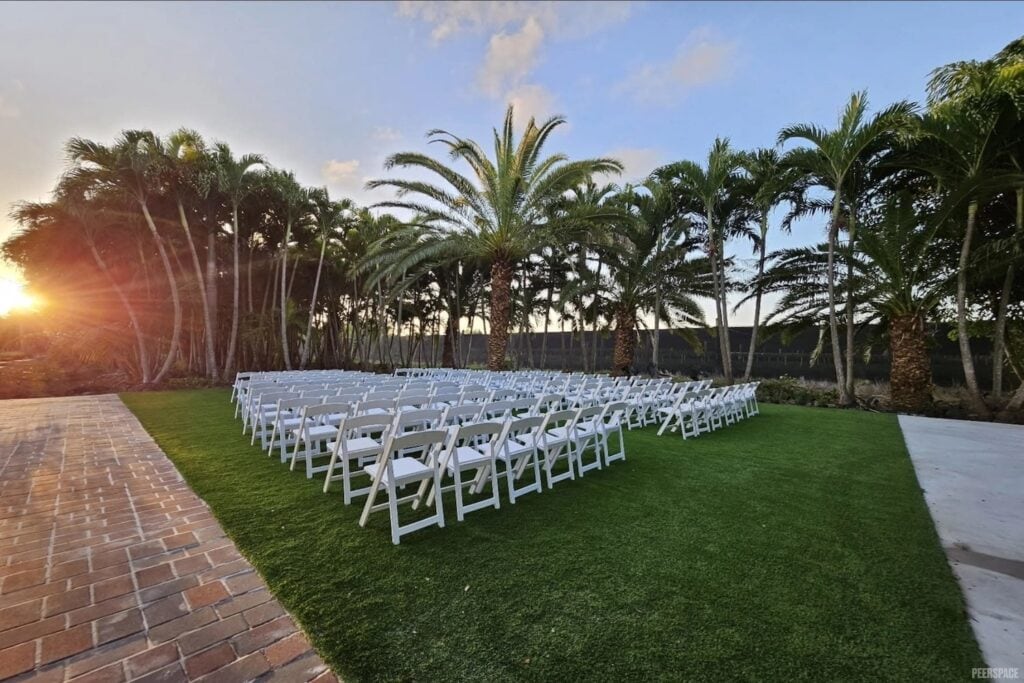
While Airbnb works great for weekend getaways or family reunions, using one for your wedding poses a whole host of problems that make it a nonstarter.
- Hard guest caps: Most Airbnb homes have strict occupancy limits designed for sleeping arrangements, not events. Going over that limit, even if you ask first, can be grounds for canceling your reservation.
- Strict event bans: Airbnb’s global party ban, made permanent in 2022, gives neighbors the power to shut you down with a single complaint.
- No event infrastructure: You’ll likely need to rent all the essentials like chairs, lights, and sound systems…not to mention hire a clean-up crew.
- Neighborhood backlash: Many Florida communities, especially beachfront areas, have cracked down on event use due to noise and parking concerns.
- Unpredictable hosts: Even if a host says “yes” to your wedding, Airbnb’s own rules can override that at any time.
Pro tip: Don’t rely on a listing’s photos or headline alone—ask detailed questions, request a written agreement, and get clear on any local rules or restrictions before putting down a deposit.
Why Peerspace is the better alternative to Airbnb
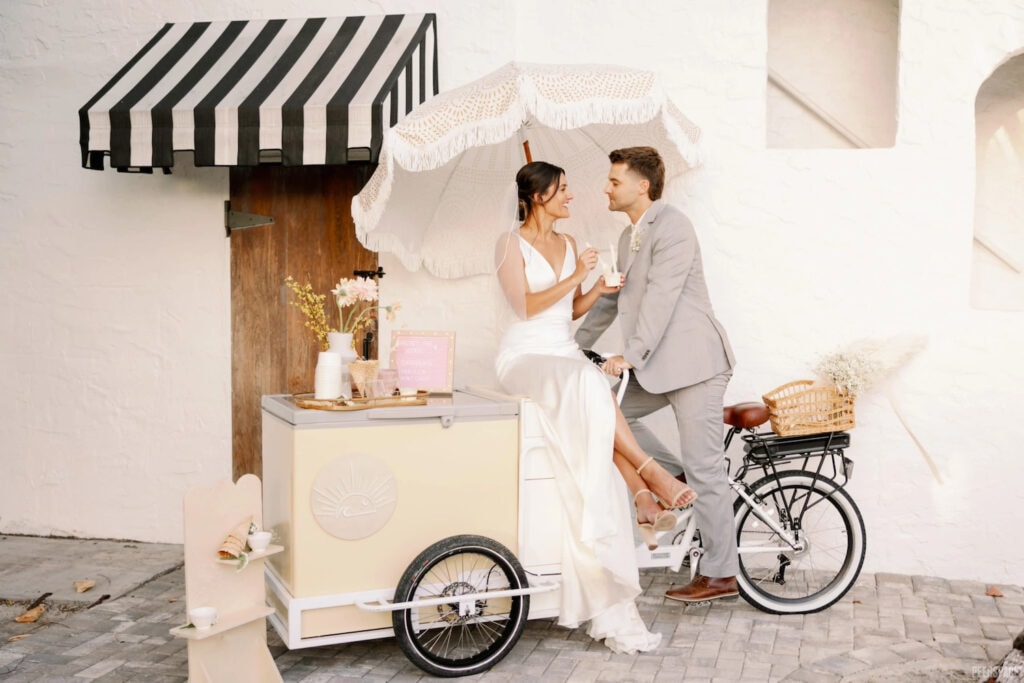
Planning a wedding in should feel exciting—not stressful. Peerspace takes the guesswork out of finding the perfect venue so you can focus on your big day.
Built for events
Unlike Airbnb, which is designed for overnight stays, Peerspace is made for weddings and parties. Every venue is listed with events in mind, and hosts welcome you to use the space to celebrate your day your way.
Party-friendly
Airbnb’s global party ban makes planning even a small wedding risky—many hosts won’t allow gatherings at all. On Peerspace, party-friendly terms are spelled out clearly so you know exactly what’s allowed from the start.
Guest capacity you can count on
Airbnb properties often have vague or restrictive guest limits, leaving you guessing if your wedding guest list will fly. Peerspace listings include clearly stated capacity limits set by the host, so you can plan confidently.
More than just homes
Airbnb offers mostly private homes, but that doesn’t always fit a wedding vibe. Peerspace gives you access to studios, gardens, lofts, estates, industrial spaces, and more—perfect backdrops for Arizona’s desert sunsets and starry nights.
Flexible rental terms
Most Airbnbs require overnight stays and multi-day minimums, even if you just need a few hours. Peerspace offers hourly bookings, so you pay only for the time you actually use.
Transparent pricing
Airbnb’s hidden fees—cleaning charges, security deposits, extra guest surcharges—can add up fast. Peerspace keeps it simple with upfront, transparent pricing, no surprises.
Event-ready amenities
Most Airbnbs don’t include anything you’d need for a wedding, leaving you to rent or bring your own. Many Peerspace venues come with event chairs, tables, audio-visual equipment, and even décor options included.
Freedom to choose your vendors
Airbnb hosts often have rules about which vendors you can or can’t bring, if they allow vendors at all. Peerspace venues give you the freedom to hire your preferred caterers, florists, and DJs without restrictions.
Support when you need it
If something goes wrong at an Airbnb, you’re left dealing with customer service that may or may not be helpful. Peerspace provides direct communication with your host, plus dedicated support if you need a hand.
Pro tip: Use Peerspace’s built-in filters to search by guest capacity, amenities, or layout. Planning becomes simpler, way less stressful, and way more transparent.
What not to do when planning a Florida wedding
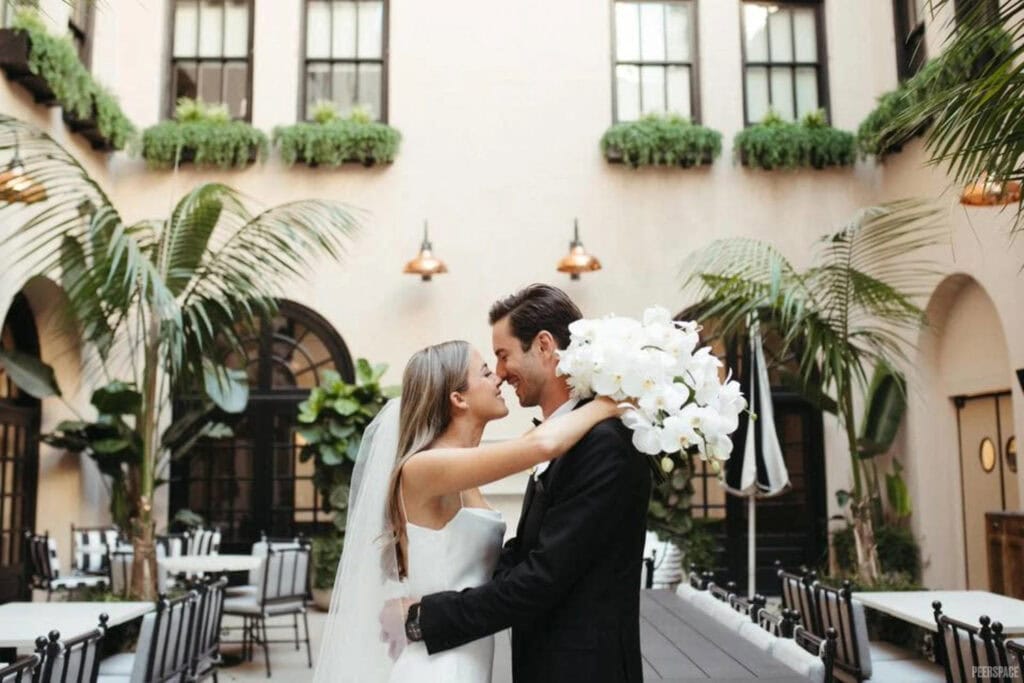
Avoiding a few common missteps can make a huge difference in how smoothly your day unfolds. Here are common slip-ups to avoid for Sunshine State weddings.
Don’t assume a beach wedding is automatically allowed
Florida’s coastal towns, from Naples to Cocoa Beach, often require permits for weddings. Some limit amplified sound, restrict decor, or set specific ceremony hours.
Don’t schedule your ceremony for noon
It might sound like a great time to get married, but the Florida sun is at its harshest then. Guests will be sweating, the bride and groom will be uncomfortable, and your photographer will struggle with shadows and squinting.
Don’t forget about the bugs
Mosquitoes, no-see-ums (yes that’s a real thing), and sand fleas are uninvited guests in Florida, especially at dusk near water. Offer repellant and light citronella candles early.
Don’t expect your venue to have it all
A rental may look beautiful, but lacking things like covered areas, indoor restrooms, or electricity access can sabotage your timeline if you’re not careful.
Don’t underestimate Florida’s weather
Even in “dry season,” Florida’s weather can change by the hour. A sunny morning can turn into a full downpour by late afternoon, especially in spring or summer. High humidity can also make outdoor ceremonies uncomfortable, with makeup meltdowns and wilting flowers.
Don’t delay your backup plan
If you need a tent, book it early. Same for misting fans, portable shade structures, or backup generators. These get booked fast in Florida’s peak seasons.
Florida wedding vibes and where to host them
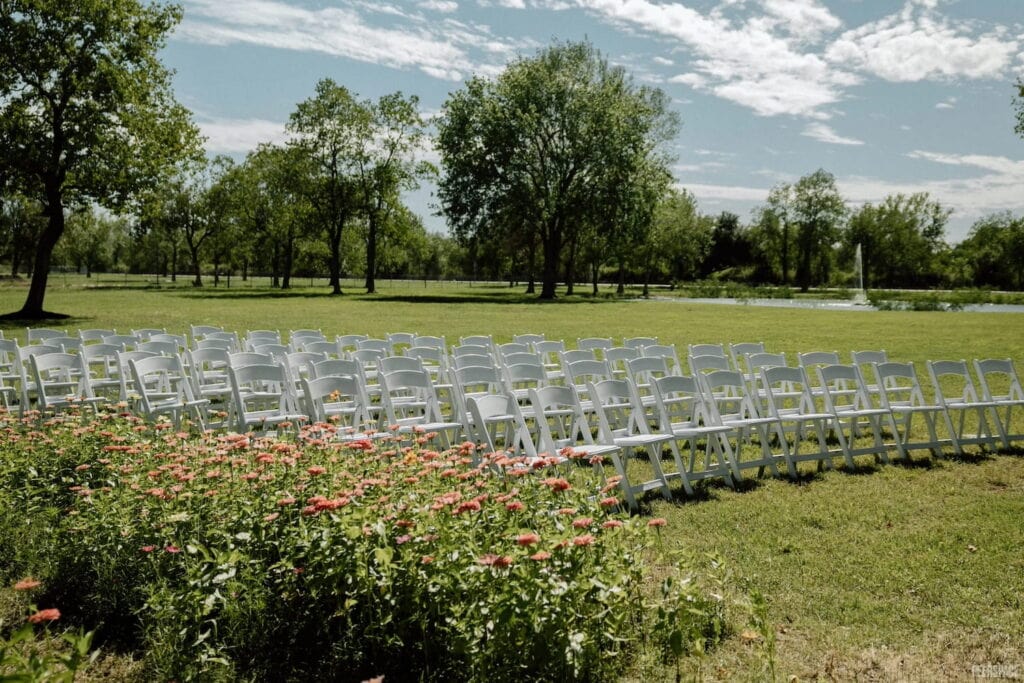
Florida venues aren’t one-size-fits-all. From coastal elegance to rustic charm, there’s a vibe to match any wedding style if you know where to look.
- Tropical luxe: Look to Palm Beach or Key West for palm-lined courtyards and oceanfront villas.
- Southern vintage: Winter Park and Fernandina Beach feature historic homes with oak trees, garden courtyards, and wraparound porches.
- Barefoot beachy: For toes-in-the-sand ceremonies, try Sanibel Island, Naples, or Clearwater.
- Urban cool: Think industrial lofts and chic rooftops in downtown Miami or Tampa.
- Eco-rustic: Gainesville or Micanopy venues offer farm tables, bamboo groves, and firefly-lit nights.
Pro tip: Don’t merely pick a location. Choose an experience. Match your venue to your wedding aesthetic, not just the guest count.
Wanting something more low-key? Here are tips and tricks for planning a minimalist wedding.
How to prep your Florida wedding venue in 7 steps
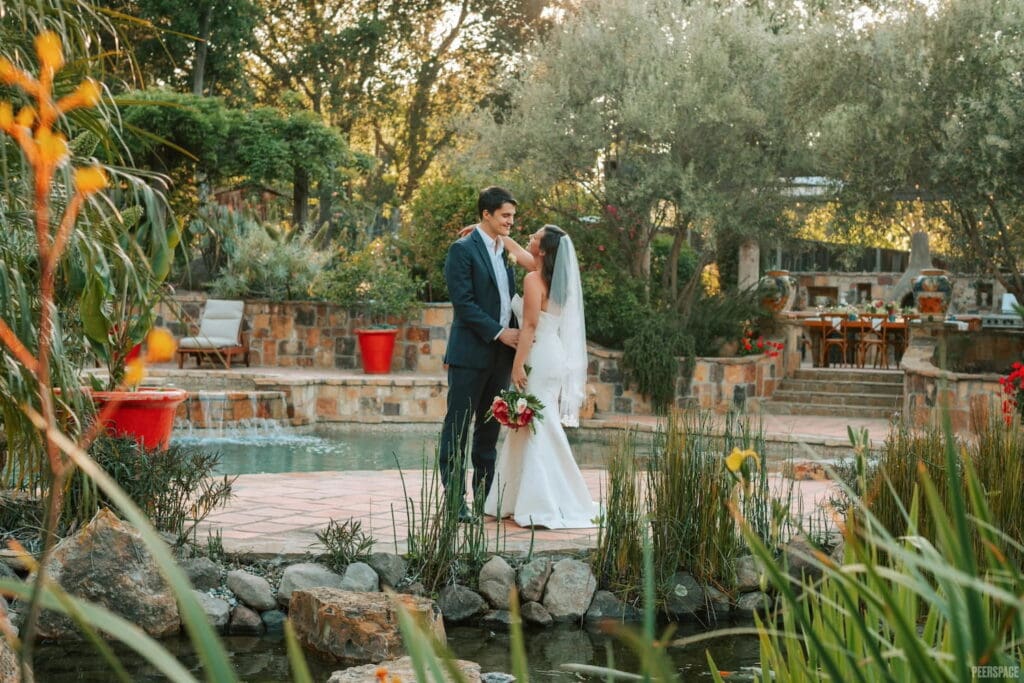
Choosing the perfect location is just the first step. Even the most perfect venue needs preparation to bring your vision to life. Here’s how to prepare your venue to have the wedding of your dreams:
1. Confirm the basics
Double-check the foundational details early: your guest capacity, rental time window, included furniture or decor, sound curfew, and any cleanup expectations. Ask your host what’s already onsite (tables? lighting? restrooms?) so you don’t over-rent or overlook key elements.
2. Coordinate your vendors
Share the venue address, load-in/load-out details, and parking information with all vendors. Provide a simple timeline and layout sketch so your florist, photographer, and caterer know where to set up and when. The smoother the arrival, the calmer your day.
3. Design the flow
Map out how guests will move through the space, from ceremony to cocktails to dinner and dancing. Place your bar, food stations, and lounge areas with flow in mind. Keep bottlenecks (like narrow walkways or single restrooms) in check.
4. Check on permits
If you’re planning a beachfront ceremony or serving alcohol, verify whether your venue (or you) need permits. Florida cities often have specific ordinances for sound amplification, outdoor cooking, or parking that can affect your setup. Check Florida’s guide to permitting as a starting point.
5. Venue walkthrough
Schedule a walkthrough 1–2 weeks before the big day with key vendors, including your planner, caterer, and coordinator if you have one. Use the time to spot potential issues, test lighting, and finalize any equipment placement.
Here’s advice from wedding planner Niki Day: “We always do site visits to make sure we really know the space & what we are working with! It helps to see the space in as many different lenses as possible to make the day come to life.”
To help ensure you make the best choice, make sure to ask these 8 essential questions before booking your venue.
6. Backup plan prep
Stock your emergency stash with essentials: a steamer, bug spray, duct tape, portable chargers, first-aid items, and extra signage. The unexpected always shows up, and this way you can take it in stride so it doesn’t throw off your big day.
7. Send instructions to guests
A week before your wedding, send guests a short guide with venue info: parking tips, dress code reminders (like lawn-friendly shoes), and directions. If your venue is tricky to find, include a Google Maps pin or visual reference.
Pro tip: Put all key info for guests on your wedding website, so they have everything they need to know before they even arrive. That way guests won’t need to ask questions, and you’ll avoid getting pulled aside every five minutes. It’s a small detail that makes a big difference.
If your wedding is already around the corner, these 10 last-minute wedding ideas can help.
Don’t forget the guest experience
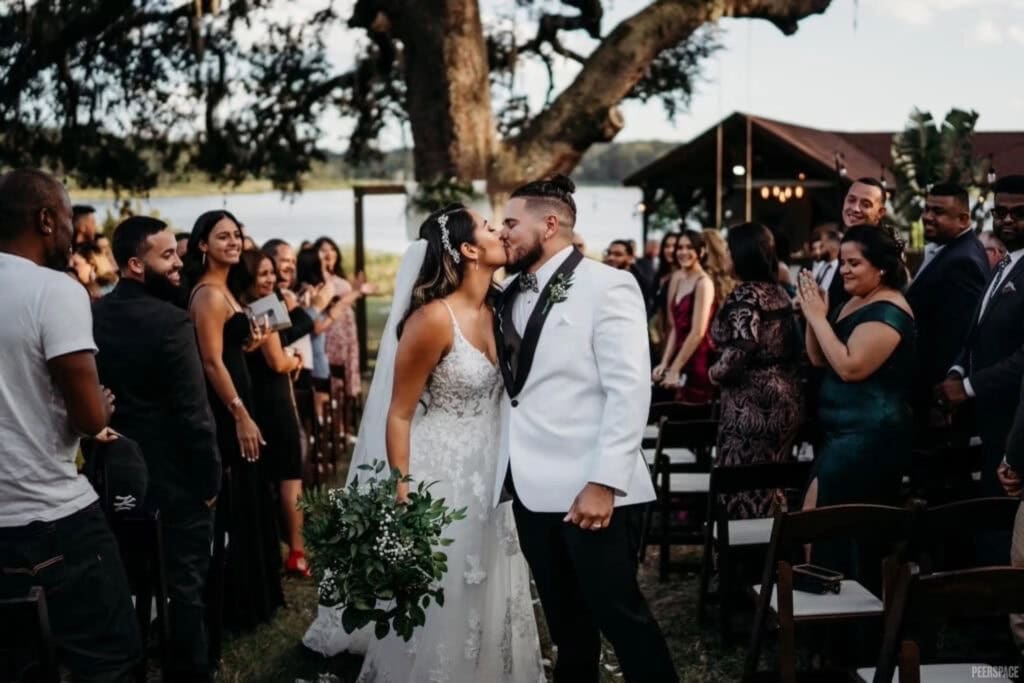
A beautiful wedding can quickly feel chaotic if your guests are uncomfortable or unsure of what’s happening. Thoughtful touches go a long way in making your day feel polished, organized, and deeply welcoming.
- Signage: Clearly mark the ceremony area, restrooms, bar, parking, reception seating, and gift table.
- Shade and seating: Provide umbrellas, parasols, handheld fans, or shaded lounges, especially for outdoor ceremonies.
- Hydration stations: Set up self-serve water coolers with citrus or cucumber slices.
- Bug control: Offer bug spray, set citronella candles, or provide individual repellant wipes.
- Arrival treats: Welcome drinks, cold towels, and sunscreen packets can be a game-changer.
- Rest areas: Add a quiet space with seating for guests who need a break, especially seniors or parents with kids.
- Accessibility: Ensure smooth paths, ramps, and clearly labeled accessible seating areas.
- Kid-friendly zones: Consider a corner with quiet activities or coloring books for young guests.
- Nighttime extras: Provide cozy shawls, blankets, or flip-flops for dancing as the night cools off.
Pro tip: Walk through your venue from a guest’s perspective (from arrival to departure) and ask: “Would I know where to go? Would I be comfortable at every stage?” That lens will catch the small things that make a big difference.
Florida wedding laws you didn’t know you needed to know
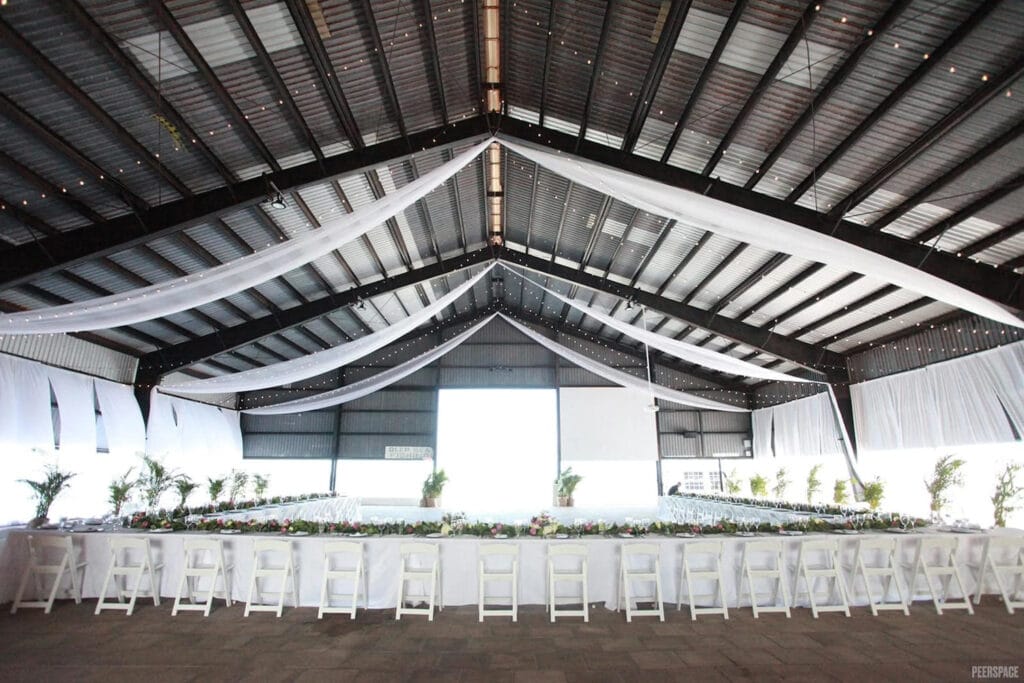
Legal details may not be glamorous, but knowing them ahead of time will help prevent unpleasant surprises and avoid last-minute scrambling.
- Licensing: Florida residents must wait three days after obtaining a marriage license to get married. Out-of-state couples can marry immediately with no waiting period.
- Alcohol rules: Some counties require a temporary permit for serving alcohol, especially if it’s served publicly. Others mandate a licensed bartender or restrict open containers.
- Beach weddings: Permits are often required, even for small ceremonies. Coastal cities like Naples and Cocoa Beach may restrict amplified sound, limit ceremony start times, and control how décor is placed on public sand.
- Noise rules: Most residential areas enforce a 10 p.m. noise curfew. Commercial or private event spaces may offer later hours, but always check.
- Fire codes and candle use: Many venues (especially indoor or historical spaces) limit open flames. Ask about candle policies and alternatives.
- Vendor insurance requirements: Some venues require all third-party vendors (caterers, DJs, rental companies) to carry liability insurance and provide proof in advance.
- Parking limitations: Urban or beachside venues may have strict parking rules or require a separate permit for valet or shuttle drop-offs.
- Drone usage: Aerial photography? Great! Just know that drone use may require FAA clearance near airports or over public beaches.
Pro tip: Don’t rely solely on your vendor’s word. Call the local city office or permitting department yourself. Each Florida county has slightly different rules, and early clarification can save you from costly missteps.
What it costs to book a wedding venue in Florida
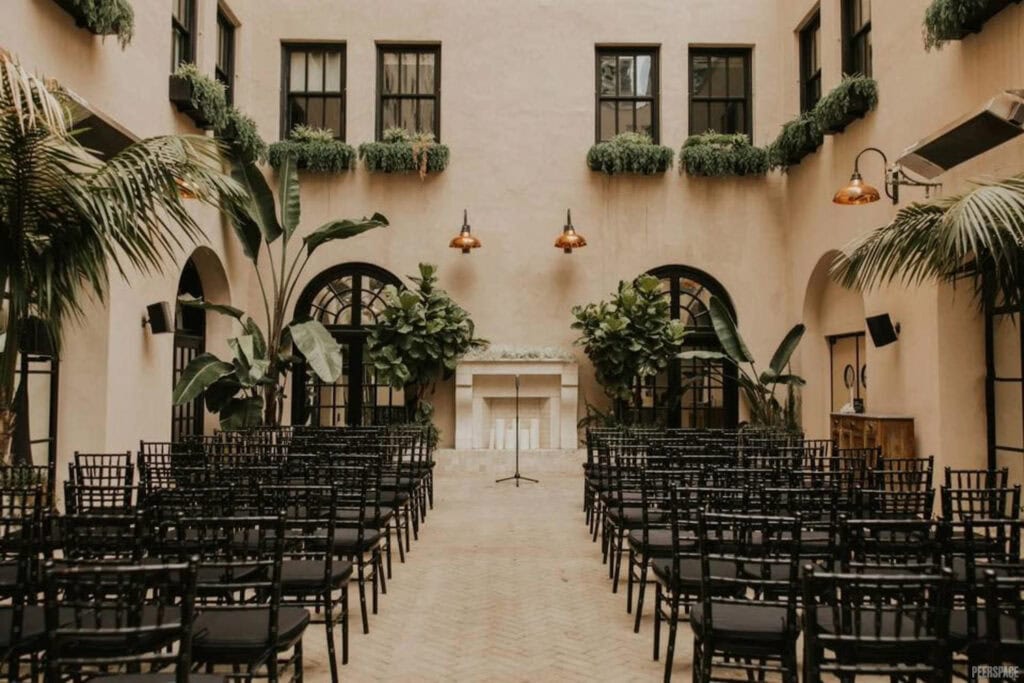
Venue pricing in Florida depends heavily on the city, venue size, and amenities offered. Understanding the going rates in major Florida wedding hubs helps you set realistic expectations and build a smarter budget from the start.
Average hourly rates by city:
- Miami: $234 per hour on average
- Smaller venues: ~$193 per hour
- Larger, premium venues: ~$553 per hour
- Smaller venues: ~$193 per hour
- Orlando: $126 per hour on average
- Smaller venues: ~$144 per hour
- Larger venues: ~$368 per hour
- Smaller venues: ~$144 per hour
- Tampa: $114 per hour on average
- Smaller venues: ~$167 per hour
- Larger venues: ~$286 per hour
- Smaller venues: ~$167 per hour
- Fort Lauderdale: $139 per hour on average
- Smaller venues: ~$224 per hour
- Larger venues: ~$343 per hour
- Smaller venues: ~$224 per hour
What affects venue pricing:
- City premiums: Expect to pay more in destination-heavy or high-demand markets like Miami and Fort Lauderdale.
- Seasonality: Peak wedding season in Florida spans late fall through spring. Prices rise accordingly, especially on weekends.
- Amenities included: Venues that come with built-in décor, lighting, tables, or even prep kitchens can reduce your need for outside rentals, offering more value per hour.
Pro tip: Peerspace’s hourly pricing model gives you more flexibility, because you only pay for the time you actually need. That alone can lead to major savings over flat-rate or full-day rentals.
Looking for the most cost-effective options? Here are the best Florida wedding venues under $1,000.
Make your Florida wedding unforgettable
Planning your wedding is all about setting the stage for one of the most meaningful days of your life. The right venue helps your wedding unfold effortlessly, from your first look to your last dance, so you can stay present in the moments that matter most.
This guide gave you the tools to think ahead, plan smart, and choose a venue that adds to, not detracts from, your big day. Whether you’re just starting to map out your wedding or deep into your vendor list, remember: the planning should be part of the fun. Start searching for your wedding venue on Peerspace.
Get together somewhere better
Book thousands of unique spaces directly from local hosts.
Explore SpacesShare your space and start earning
Join thousands of hosts renting their space for meetings, events, and photo shoots.
List Your Space



